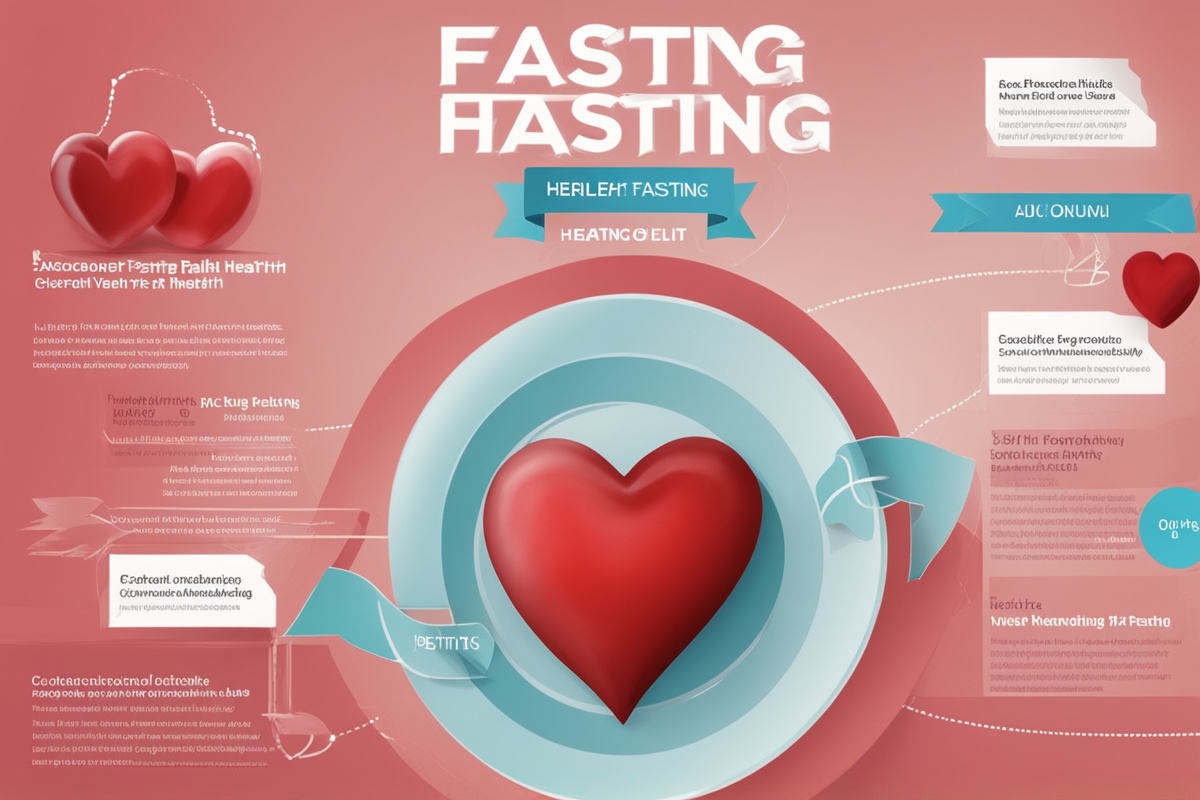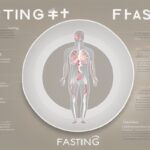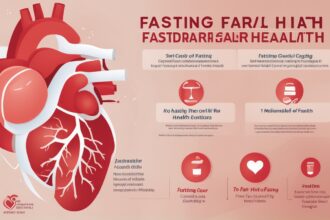Hey there, health enthusiasts! If you’re exploring ways to improve your cardiovascular wellness while embracing a fasting lifestyle, you’ve landed in the right spot. Today, we’re diving deep into the fascinating connection between fasting and heart health—a topic that’s gaining traction in both scientific circles and among everyday folks looking to optimize their well-being. Whether you’re a seasoned faster or just curious about how skipping a meal (or two) could benefit your ticker, this post will unpack the science, offer practical tips, and show you how fasting heart health can be a game-changer. Let’s get started on this heart-smart journey together!
What Is Fasting, and How Does It Relate to Heart Health?
Fasting, in its simplest form, is the voluntary abstention from food and sometimes drink for a specific period. From intermittent fasting (IF) schedules like 16:8 (16 hours fasting, 8 hours eating) to longer fasts like 24-hour or multi-day fasts, this practice has been around for centuries, often tied to cultural or spiritual traditions. But in recent years, fasting has taken center stage in health discussions, especially for its potential benefits on cardiovascular health. So, how does fasting heart health tie together? When you fast, your body shifts into a metabolic state that can reduce inflammation, improve blood pressure, and even lower cholesterol levels—all key players in maintaining a healthy heart (Fung & Moore, 2016).
Research suggests that fasting triggers a process called autophagy, where your cells clean out damaged components, which may protect against heart disease. Plus, fasting often leads to weight loss, a major factor in reducing strain on your heart. As we dig deeper, you’ll see why more people are turning to intermittent fasting for heart health as a natural, sustainable approach.
The Science Behind Fasting and Cardiovascular Benefits
Let’s nerd out for a minute on the science of fasting heart health. Studies have shown that intermittent fasting can positively impact several risk factors for heart disease, which remains the leading cause of death worldwide. For starters, fasting can lower blood pressure, a critical marker for cardiovascular strain. A study found that participants engaging in alternate-day fasting saw significant reductions in systolic blood pressure after just a few weeks (Varady et al., 2013). This happens partly because fasting reduces insulin levels, which in turn helps decrease sodium retention and eases pressure on blood vessels.
fasting for cardiovascular health into your routine, but it’s not a one-size-fits-all solution, as we’ll explore later.
Key Heart Health Benefits of Fasting
Now that we’ve covered the science, let’s break down the specific ways fasting can support your heart. Whether you’re focused on prevention or managing existing risk factors, understanding these benefits can motivate you to give fasting heart health a try. Here are some standout advantages:
- Weight Management: Excess body fat, especially around the abdomen, puts stress on the heart. Fasting promotes weight loss by reducing calorie intake and boosting fat-burning through ketosis (Mattson et al., 2017).
- Blood Sugar Control: Fasting improves insulin sensitivity, which helps regulate blood sugar levels—a crucial factor in preventing diabetes, a major risk for heart disease.
- Reduced Oxidative Stress: Fasting decreases the production of free radicals, which can damage heart cells over time, offering a protective effect (Longo & Mattson, 2014).
- Improved Heart Rate Variability: Some studies suggest fasting enhances autonomic nervous system balance, leading to better heart rate regulation.
These benefits aren’t just theoretical—they’re backed by emerging research and real-world experiences from fasting communities. However, the extent of these effects can vary based on individual health conditions and fasting methods.
Practical Tips for Incorporating Fasting into a Heart-Healthy Lifestyle
Ready to explore fasting for heart wellness? Before you jump in, it’s important to approach fasting thoughtfully, especially if heart health is your primary goal. Fasting isn’t about starving yourself—it’s about creating a sustainable rhythm that supports your body. Here are some actionable tips to get started while keeping your cardiovascular system in mind:
- Start Slow: If you’re new to fasting, begin with a gentle approach like the 12:12 method (12 hours fasting, 12 hours eating) before progressing to longer fasts like 16:8.
- Stay Hydrated: Dehydration can strain your heart, so drink plenty of water during fasting windows. Herbal teas or black coffee (without sugar) are also fine.
- Focus on Nutrient-Dense Foods: When you do eat, prioritize heart-healthy foods like fatty fish, nuts, leafy greens, and whole grains to maximize benefits.
- Monitor Your Body: Pay attention to how you feel. If you experience dizziness or palpitations, stop fasting and consult a healthcare provider.
- Pair with Exercise: Light activities like walking during fasting can enhance cardiovascular benefits, but avoid intense workouts until you’re adapted.
Remember, consistency matters more than perfection. Tailor your fasting schedule to fit your lifestyle, and don’t hesitate to seek guidance from a doctor or dietitian if you have pre-existing heart conditions.
Potential Risks and Considerations for Heart Health While Fasting
While the perks of fasting heart health are exciting, it’s not without potential pitfalls. Fasting isn’t suitable for everyone, especially if you have certain medical conditions or are on medications that affect blood sugar or blood pressure. For instance, prolonged fasting can sometimes lead to electrolyte imbalances, which might trigger irregular heart rhythms in susceptible individuals (Cahill, 2006). It’s also worth noting that overdoing fasting—especially without proper nutrition—can cause fatigue or stress, indirectly impacting heart health.
If you’re on heart medications like beta-blockers or have a history of arrhythmias, fasting should only be done under medical supervision. Pregnant women, older adults, and those with eating disorder histories should also approach fasting with caution. The key takeaway? Personalization and moderation are critical when exploring intermittent fasting for heart health.
How to Combine Fasting with Other Heart-Healthy Habits
Fasting is a powerful tool, but it’s not a standalone fix for cardiovascular wellness. To truly maximize fasting heart health benefits, pair it with other heart-smart habits. Think of fasting as one piece of a larger puzzle. For example, managing stress through mindfulness or meditation can complement fasting’s effects on blood pressure. Regular physical activity—aim for at least 150 minutes of moderate exercise per week, as recommended by the American Heart Association (AHA, 2020)—also works hand-in-hand with fasting to strengthen your heart.
Don’t forget the importance of sleep, either. Poor sleep is linked to higher risks of heart disease, and fasting can sometimes disrupt sleep patterns if not timed right. Eating your last meal a few hours before bed can help. Lastly, avoid smoking and limit alcohol, as these habits can undo the positive impacts of fasting for cardiovascular health. Building a holistic routine is the best way to ensure long-term heart protection.
As we wrap up, it’s clear that fasting heart health isn’t just a passing trend—it’s a promising strategy backed by science and embraced by many for its cardiovascular benefits. From lowering blood pressure to improving cholesterol levels, intermittent fasting offers a natural way to support your heart, especially when paired with a balanced lifestyle. That said, it’s not a magic bullet, and individual needs vary. Listen to your body, start slow, and consult with a healthcare professional if you’re unsure. Here’s to taking small, mindful steps toward a stronger, healthier heart through fasting and beyond!
References
- American Heart Association. (2020). Recommendations for Physical Activity in Adults and Kids. Retrieved from https://www.heart.org
- Cahill, G. F. (2006). Fuel metabolism in starvation. Annual Review of Nutrition, 26, 1-22.
- Fung, J., & Moore, J. (2016). The Complete Guide to Fasting: Heal Your Body Through Intermittent, Alternate-Day, and Extended Fasting. Victory Belt Publishing.
- Longo, V. D., & Mattson, M. P. (2014). Fasting: Molecular mechanisms and clinical applications. Cell Metabolism, 19(2), 181-192.
- Ageing Research Reviews, 39, 46-58.
- Patterson, R. E., & Sears, D. D. (2017). Metabolic effects of intermittent fasting. Annual Review of Nutrition, 37, 371-393.
- Varady, K. A., Bhutani, S., Klempel, M. C., & Kroeger, C. M. (2013). Alternate day fasting for weight loss in normal weight and overweight subjects: A randomized controlled trial. Nutrition Journal, 12, 146.






